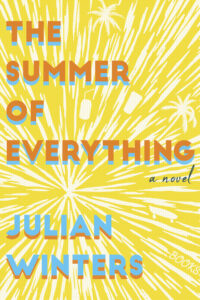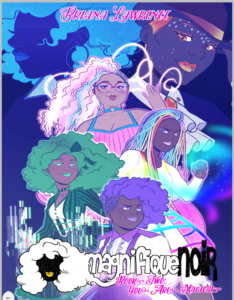“The Sound of Stars” Shows the Power of Art in Dark Times
"The Sound of Stars" Shows the Power of Art in Dark Times
Two years after aliens known as the IIori invaded Earth and decimated a third of the population, a seventeen-year-old girl named Ellie Baker lives in an IIori-controlled center in New York City.
Although she is reduced to a state of surviving rather than living, she also quietly rebels against the IIori by hosting an illegal library of books. When her library is discovered by Morris, an IIori commander who loves banned pop music, the two gradually learn to trust each other and turn their mutual quiet rebellions into a louder one.
 One of the strengths of this book is its compelling cast of characters. The main human protagonist, Elle Baker, is a Black bi demisexual with anxiety. She also loves books. Though she is very tired of the world that the IIori has forced her and her loved ones to live in, she is resilient, too. Before she meets Morris, the Ilori commander who is the book’s second protagonist, she is only surviving for the sake of her family and the chance to give people strength by loaning books from her illegal library.
One of the strengths of this book is its compelling cast of characters. The main human protagonist, Elle Baker, is a Black bi demisexual with anxiety. She also loves books. Though she is very tired of the world that the IIori has forced her and her loved ones to live in, she is resilient, too. Before she meets Morris, the Ilori commander who is the book’s second protagonist, she is only surviving for the sake of her family and the chance to give people strength by loaning books from her illegal library.
Despite being a different species from Elle, Morris is also surviving more than living. Though he shares the DNA of the highest-born family in the IIori Empire and physically resembles a Latinx teen boy, he is treated badly due to being a lab-made IIori rather than a natural-born IIlori. He is also different from true IIori in that he feels emotions in a way similar to humans, has a strong appreciation of music from human music artists, and considers life to be sacred. Yet Morris is complicit in the destruction and subjugation of the human race, having following orders to maintain his own survival. There is also more to his role than initially meets the eye, a quiet rebellion similar to Elle’s that I can’t explain for spoiler reasons.
Not only does the book let the reader get to know Elle and Morris by alternating between each of their points of view, but Elle and Morris are also shaped by their experiences with certain secondary characters. Before and after the alien invasion occurred, Elle and her family had to deal with racism in their everyday lives from some white people who felt they were a threat. Mr. Hughes, landlord of the building that Elle and her family live in, is one example. To make matters worse, Elle’s mom is an alcoholic, while Elle’s dad is a shell of his former self after having been given the IIori vaccine that makes people obedient to them. Elle’s best friend is Alice, a blonde bi girl who was Elle’s first crush. Though Alice is loyal and a good listener, I wish Elle had been shown with Black girl friends, too.
Morris, on the other hand, has only his personal assistant, Avirola, as a loyal companion. His parents are far away, and his brother, Brixton, is loyal to the high-born IIori. Morris is engaged to Orsa, a cruel and vicious female IIori who he was arranged to marry and does not love at all. When asked by Elle why he loves music, he replies, “Music makes me feel. I like feeling.” For Morris, music is the only way he can feel like himself and not like someone unwanted.
Although Elle and Morris have their own artistic tastes, they gradually bond over music and stories. This is a poignant way for them to connect considering that all artistic forms of human expression are banned by the IIori. In addition to enjoying music and books from real-life authors and music artists, there is a fictional pop group known as The Starry-Eyed that the two gush over. The group’s thoughts and lyrics are featured throughout the book to give depth to Elle and Morris’ relationship and exemplify the importance of people using art to relate to each other.
In addition excellent characterization, Alechia Dow’s The Sound of Stars is a page-turner due to how it balances the bleakness of a postapocalyptic alien invasion with the hope of people connecting with each other through art. This is very true to life, because despite an ongoing pandemic, acts of racist violence, and the banning of books written by marginalized groups, people have still found strength and joy in books and music. The hope and despair that Elle and Morris feel is expressed in many quotable lines of dialogue such as, “If someone keeps stripping away our things, rights, freedoms, then we’ll hold on to what we know. That’s what we’ve always done.”
In fact, aside from Elle’s not having more Black friends, the only issue that I had with this book is that it ends on a cliffhanger. Although I didn’t go into the book expecting everything to be resolved at the end, finally reaching the ending made me want to read more.
All in all, The Sound of Stars is a beautiful book that shows the power of art in dark times.

The Afro YA promotes black young adult authors and YA books with black characters, especially those that influence Pennington, an aspiring YA author who believes that black YA readers need diverse books, creators, and stories so that they don’t have to search for their experiences like she did.
Latonya Pennington is a poet and freelance pop culture critic. Their freelance work can also be found at PRIDE, Wear Your Voice magazine, and Black Sci-fi. As a poet, they have been published in Fiyah Lit magazine, Scribes of Nyota, and Argot magazine among others.


 One of the best things about this book is the complex depiction of various relationships that Isaac has and develops. At the beginning of the book, Isaac has a loving and mildly tense relationship with his Black mom due to their different opinions on Isaac’s dad, Carlos. He also has a somewhat tense relationship with his older brother, Iggy, and solid relationships with his older sister, Bella, his abuelito, and his best friend, Diego. As the book progresses, some of Isaac’s core relationships change due to his attempts to form new ones with Davi and with Diego’s gamer friends.
One of the best things about this book is the complex depiction of various relationships that Isaac has and develops. At the beginning of the book, Isaac has a loving and mildly tense relationship with his Black mom due to their different opinions on Isaac’s dad, Carlos. He also has a somewhat tense relationship with his older brother, Iggy, and solid relationships with his older sister, Bella, his abuelito, and his best friend, Diego. As the book progresses, some of Isaac’s core relationships change due to his attempts to form new ones with Davi and with Diego’s gamer friends.


 The Summer of Everything by Julian Winters
The Summer of Everything by Julian Winters






Recent Comments